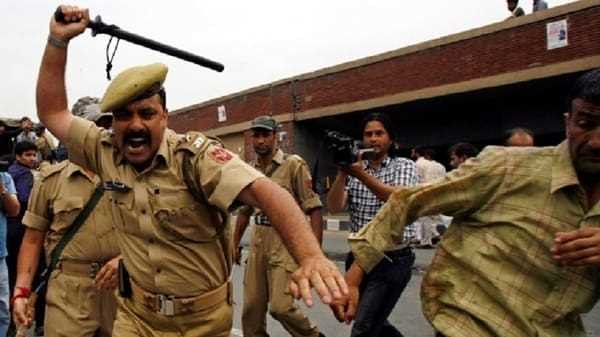- About
- Topics
- Picks
- Audio
- Story
- In-Depth
- Opinion
- News
- Donate
-
Signup for our newsletterOur Editors' Best Picks.Send
Read, Debate: Engage.
| topic: | Freedom of Expression |
|---|---|
| located: | India |
| editor: | Tish Sanghera |
An uninvited knock on the door, followed by extensive questioning and confiscated hard drives: this is how things usually unfold when tax authorities arrive at the premises of some of India’s most outspoken critics and high-profile social activists.
This week, Harsh Mander - a civil rights activist and the founder of the Centre for Equity Studies (a policy research organisation) - had his premises raided by the Enforcement Directorate, which justified the invasion under the ‘Prevention of Money Laundering Act’. Mander’s is the latest in a series of harassment cases against activists, academics and journalists in retribution for questioning the government’s discriminatory policies against muslims, its human rights record and its handling of the COVID-19 pandemic.
Days earlier, Bollywood actor Sonu Sood was subjected to the same protocol. Sood had raised huge sums for migrant workers stranded in cities without income or food during the COVID-19 lockdowns, and helped thousands of them reach home. Though he never directly attacked the government, his charitable actions were perceived as an offense by India’s leadership since they drew attention to the regime’s failures. The authorities now accuse him of tax evasion and collecting foreign donations through an illegal platform.
Similarly, an opposition youth leader, BV Srinivas, who worked tirelessly to procure oxygen cylinders and hospital beds for the needy during India’s brutal second COVID-19 wave has also come under investigation and was questioned by the police.
Human Rights Watch has called the Bharatiya Janata Party’s (BJP) practice of tax raids part of “an escalating crackdown on freedom of expression, association, and peaceful assembly since coming to power in 2014.” The watchdog says the pattern of raids “appear intended to harass and intimidate critics,” and reflect a broader strategy of trying to silence dissenting voices.
The government is also targeting media outlets in the same way, which further shows its commitment to intimidating anyone who dares to portray its rule in a negative light.
This raiding has also affected some of the BJP’s allies: Dainik Bhaskar, a hugely popular and influential Hindi language newspaper, exposed the large number of bodies piling up on the Ganges’ banks during the peak of this year’s Coronavirus surge - its offices were subsequently raided. The paper is usually a hearty BJP supporter and has backed Prime Minister Modi’s leadership, but after its impressive ground reports showed the incompetence and callousness of the BJP state government, it was decided that it too should be taught a lesson.
Unfortunately the tax raids are likely achieving their desired impact. The raids create a chilling effect and an atmosphere of fear, which is all an authoritarian power needs to keep people in line. Celebrities, businessmen and other public figures have been learning this lesson over the past few years. What hope is there then for Indian civil society and democracy with such censorship at play?
Photo by Jeshika Sinojia

